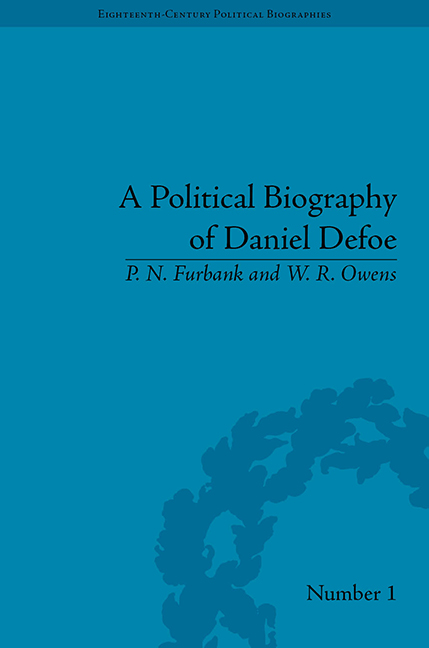Book contents
- Frontmatter
- CONTENTS
- The Authors
- Acknowledgements
- Abbreviations
- Introduction
- 1 Poetry, Pamphleteering and the Pillory
- 2 Defoe and the Dead King
- 3 The Author of the Review
- 4 Propagandist for the Union
- 5 ‘Maintaining a Counter Correspondence’
- 6 1710: The Fateful Step
- 7 Defoe and the Whig Split
- 8 The Return of the Prodigal
- Appendices A Three Recently-Discovered Letters from Defoe to Godolphin (1708)
- Appendices B The ‘Sir Andrew Politick’ Letter (25 October 1718)
- Appendices C Defoe's An Appeal to Honour and Justice (1715)
- Notes
- Index
3 - The Author of the Review
- Frontmatter
- CONTENTS
- The Authors
- Acknowledgements
- Abbreviations
- Introduction
- 1 Poetry, Pamphleteering and the Pillory
- 2 Defoe and the Dead King
- 3 The Author of the Review
- 4 Propagandist for the Union
- 5 ‘Maintaining a Counter Correspondence’
- 6 1710: The Fateful Step
- 7 Defoe and the Whig Split
- 8 The Return of the Prodigal
- Appendices A Three Recently-Discovered Letters from Defoe to Godolphin (1708)
- Appendices B The ‘Sir Andrew Politick’ Letter (25 October 1718)
- Appendices C Defoe's An Appeal to Honour and Justice (1715)
- Notes
- Index
Summary
Defoe's journal the Review was launched at an auspicious time. In 1695 the Licensing Act of 1662, by which books and pamphlets had to receive official approval before they could be published, had been allowed to lapse, and the result had been a great upsurge of pamphleteering and journalism. Newspapers (to use the words of Laurence Hanson) began to ‘encroach on the whole field of politics’.
Attempts, now and later, were made to revive the licensing system, but without success. The High Church party brought a bill to ‘restrain the licentiousness of the press’ before the Commons in January 1704, only a week or two before the launching of the Review; and a few days before the bill's first reading Defoe published an Essay on the Regulation of the Press. In this he took what would always remain his stance over the matter. He granted there must be some restriction on the press, and that authors who broke the laws of libel or blasphemy ought to be punished; but pre-publication licensing, he contended, was to make the press ‘a slave to a Party’, and to put ‘an absolute Negative on the Press’ into the hands of a licenser would be ‘the first step to restore Arbitrary Power in this Nation’. The right method was, rather, to spell out what matters of Church and State were not to be criticized and to punish offending authors after publication.
- Type
- Chapter
- Information
- A Political Biography of Daniel Defoe , pp. 33 - 60Publisher: Pickering & ChattoFirst published in: 2014



